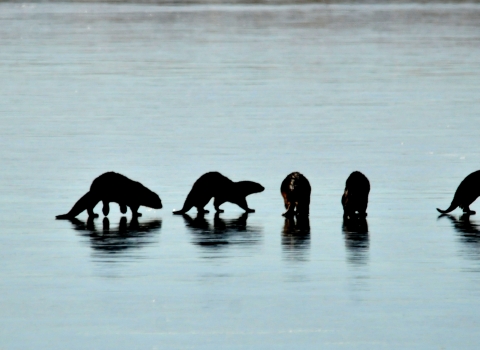This story was written by Science Applications Program Directorate Fellow, Amanda DeVleeschower. Learn more about Science Applications Program here.
Appalachian monkeyface (Theliderma sparsa) is a species of freshwater mussel whose only population remains in a 20-mile reach of the Powell River extending from northeast Tennessee into southwest Virginia. Historically, this rare mussel has encountered decline by damming, siltation and pollution. The Powell River Watershed has undergone major restoration efforts by state and federal agencies but now the watershed is dealing with a far bigger beast: climate change climate change
Climate change includes both global warming driven by human-induced emissions of greenhouse gases and the resulting large-scale shifts in weather patterns. Though there have been previous periods of climatic change, since the mid-20th century humans have had an unprecedented impact on Earth's climate system and caused change on a global scale.
Learn more about climate change .
Climate change is altering water flows, water temperatures and water quality in freshwater ecosystems, which is having negative impacts on fish and macroinvertebrate habitat. Freshwater mussels, like bees and coral, are vital to their ecosystems. Mussels improve water quality by filtering particles from the water as they feed. These small but mighty filter feeders can filter out sediment, agricultural run-off, fecal matter, and even some herbicides and pharmaceuticals. As mussels filter, they also lock in certain greenhouse gases, like carbon, and permanently remove it from our atmosphere for decades. Because mussels anchor themselves into the riverbed, they stabilize the riverbed to better protect it from flash flooding or erosion. As climate change is expected to reduce water quality and increase intensity of storms and precipitation, freshwater mussels act as a natural defense against our changing climate and help protect our valuable aquatic habitats.
However, mussels are one of the most sensitive and rapidly declining species in the world. Their fascinating life cycles make them susceptible to climate change and other stressors.
Male mussels release sperm into the water, which female mussels filter out to fertilize eggs that develop into larvae. The female mussels then release thousands of larvae into the water column that must attach to the gills or skin of a suitable host fish. Most freshwater mussels use only one type of fish as their host fish, with different fish serving as hosts for different mussels. The larval mussel remain attached to the fish for 2-5 weeks, when they drop off and bury themselves in the bottom of the stream. Because of this unique relationship with freshwater fish, mussel survival also relies on the survival of their host fish. Climate change can reduce the abundance of certain host fish, shift their distribution, or change the time of year when they are present. Mussels that depend on those fish will suffer consequences when the larvae are seeking hosts that may no longer be available.
This has already impacted rare mussels, such as the Appalachian monkeyface, which is currently one of the rarest mussels in the United States. Scientists believe that it’s suspected host fish, the slender chub, is locally extinct in the Powell River and captive breeding of the fish is not an option.
Scientists have been working to make the Powell River more habitable for freshwater species through restoration efforts like stream bank stabilization, reclamation of former mining land, and planting of native riparian riparian
Definition of riparian habitat or riparian areas.
Learn more about riparian vegetation.. Because of their ecological importance and their ability to naturally defend against the impacts of climate change, restoring mussels in the Powell River is essential to the long-term viability of the river.
Reintroducing mussels is no easy feat, especially when their host fish is unknown. This is where Virginia Department of Wildlife Resources' Aquatic Wildlife Conservation Center (AWCC), in Marion, Virginia came into the picture. The Service’s Southwest Virginia Field Office provided funding to the state from 2018 to 2020 to find suitable host fish for five freshwater mussel species native to the Upper Tennessee River Basin. All of the mussels in this area, including the Appalachian monkeyface, are listed as endangered under the U.S. Endangered Species Act.
To determine a suitable fish host, AWCC crew first needed to find and acquire Appalachian monkeyface in the wild, which was a challenging task given the species’ rarity. Scientists started searching in May 2018. After spending 78 intensive hours searching multiple sites in the Powell River, they found five live Appalachian monkeyface adults and started experimental trials in 2019.
While in captivity in early May through mid-June of 2019, the mussels released viable larvae. This allowed the research team to conduct trials on twenty different fish species including species such as River Chub, Golden Redhorse, Bluegill Tangerine Darter, Yellow Bullhead, Red Breast Sunfish, and Fathead Minnow. Unfortunately, none of these trials were successful. Though unsuccessful in propagation, this trial and error allowed them to narrow down further on potential host fishes, each failed trial meant they were one step closer to a breakthrough.
The fish trials continued in 2020, this time with nine species such as longnose dace, bigeye chub, western blacknose dace, and fantail darters. Then almost two years after finding the first Appalachian monkeyface in the wild, the AWCC crew saw their first success when the longnose dace proved to be a successful host! Five larvae successfully transformed to juveniles on the longnose dace. This is the first confirmed host fish for the Appalachian monkeyface mussel after the Slender Chub and was the biggest success this species has had in recent history.
“Seeing the first juvenile alive in that petri dish was an amazing feeling,” says Tim Lane, who is the Mussel Recovery Coordinator at AWCC. “I think we high-fived and hooted quite a bit! The first thing I thought of was how proud I was of my team of biologists at AWCC for their effort, dedication, and problem-solving abilities that made this achievement possible.”
However, the success didn’t stop there. Next, the blotched chubs were determined to be a successful host, with 23 juvenile mussels successfully transforming. Blotched chubs went through another trial, this time resulting in 346 transformed juvenile mussels. One last trial from the Blotched Chubs resulted in 606 successfully transformed juveniles.
In two summers of collecting Appalachian monkeyface from the wild, scientists could only find five adults in the wild. But here, in the Aquatic Wildlife Conservation Center, there were almost 1,000 new juveniles that successfully survived on four different host species. With four identified host fish, longnose dace, blotched chub, streamline chub and western blacknose dace, and over 1,000 juveniles, this is the most promising work for this species ever accomplished.
Tiffany Leach, one of the mussel recovery biologists who worked tirelessly on this project made it clear they were not done with this success story. “It's a fantastic step in the right direction for this species, but they're not out of the woods yet. It seems that we're always learning new things and have this huge responsibility to ensure the species doesn't go extinct.”
They aim to release these juvenile mussels throughout the Powell River and spread individuals strategically to increase their genetic diversity and thus promote resistance against potential threats within the river. This success, partnered with restoration efforts of fisheries, provides a hopeful future for mussels in the Powell River. Not only did the Appalachian monkeyface see success, but scientists also found host fish for four other federally listed Endangered mussels (cracking pearlymussel, rough pigtoe, rough rabbitsfoot and Cumberland monkeyface) and have been sharing successful propagation methods with mussel biologists across the United States. After two years of dedication, curiosity and patience, the Appalachian monkeyface has seen undeniable success in the face of climate change.
"The fish host and propagation work conducted by the AWCC staff to successfully culture two of the rarest and most difficult mussel species in North America, the Appalachian and Cumberland monkeyfaces, demonstrates how the hard work, persistence and innovation of people are the true game changers for endangered species conservation,” said Jess Jones, a Service restoration biologist and the co-director of the Freshwater Mollusk Conservation Center. These mussel larvae have gotten their start from the perseverance of dedicated mussel scientists, now it's up to their own perseverance to ensure species recovery in the face of climate change.


